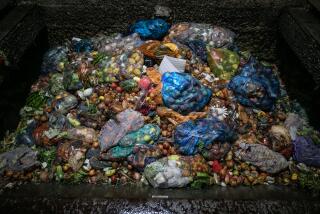S. Korea Struggles to Cope With New-Found Success
SEOUL — Economists liken South Korea to a teen-ager who has grown up too fast and is being forced to take on unwanted responsibility.
It is being told to do many of the things the United States has already forced on Japan, such as to open its markets and to liberalize trade, but at a much earlier stage in its development.
Although it is defiantly proud of its rapid rise into position as the world’s 13th-largest trading nation, South Korea still lacks confidence in its ability to take on the added responsibility.
“There’s a bantam cock approach,” said John Duthie, manager in Korea for Deutsche Bank. But they still “have a terrible inferiority complex.”
Government technocrats, after years of running the economy as virtually their own fiefdom, are gradually, and at times reluctantly, loosening their control as Seoul develops an economic democracy to go along with its new political climate.
The rapid growth of recent years has meant that some sectors of the economy, such as exports, have fully matured, while others remain undeveloped.
Many big companies are basically family-run firms. Almost all are deep in debt to the banks--as would be expected in a country still developing, Duthie said.
Seoul’s booming exports led to a huge $9.6-billion trade surplus with the United States last year, causing friction between the two military partners. The United States has about 40,000 troops stationed in South Korea.
The U.S. response, according to Duthie, has been to occasionally “rap the knuckles” of the Koreans to remind them of the need for fair trade.
U.S. Secretary of State George Shultz lectured Seoul earlier this month about the need for open markets and reminded it of the big part Washington has played in establishing the free trade system South Korea and the world enjoys.
“We have played a big part in creating the open trading system from which we and the Korean people have benefited tremendously,” Shultz said in Seoul. “We want to keep it that way and open it further.”
The U.S. pressure, especially for more cigarette imports, has sparked resentment among some Koreans who feel that Washington is asking too much of a country that is still developing.
“It really angered so many Koreans the way the U.S. was pushing,” said Young Soo-gil, senior fellow at the government-run Korea Development Institute.
Young should know. In April, farmers angered by U.S. demands that South Korea import beef pelted him with cow dung after he gave a lecture on free trade.
Seoul feels misunderstood by its bigger trading partner and has turned elsewhere for support, economists said.
Many businessmen and journalists in the country have become infatuated with the possibility of increased trade and the establishment of diplomatic links with China--an old friend, in the words of Young--after the Olympics, starting in September.
Economists warned them against expecting too much from China, which remains one of the world’s poorest countries.
“The China market has been excessively hyped since the mid-19th Century, when you had British textile manufacturers saying, ‘If only every (Chinese) wore his trousers an inch longer, we’d all be millionaires,’ ” said William Stoops, director of U.S. broker Citicorp Scrimgeour Vickers.
Korean officials would like closer ties with Asia’s other newly industrializing nations--Taiwan, Singapore and Hong Kong--whose trade policies have also come under U.S. pressure.
They admitted that it would be hard to do and said that they could not afford to go too far because of fear of antagonizing South Korea’s main trading partners, the United States and Japan.
Seoul has looked to Japan as a role model for guidance in how to deal with American displeasure. Like Japan, it has let its currency rise to make its exports less attractive.
An explosion in wages, at times accompanied by bitter strikes, has also reduced its competitiveness.
More to Read
Sign up for Essential California
The most important California stories and recommendations in your inbox every morning.
You may occasionally receive promotional content from the Los Angeles Times.










